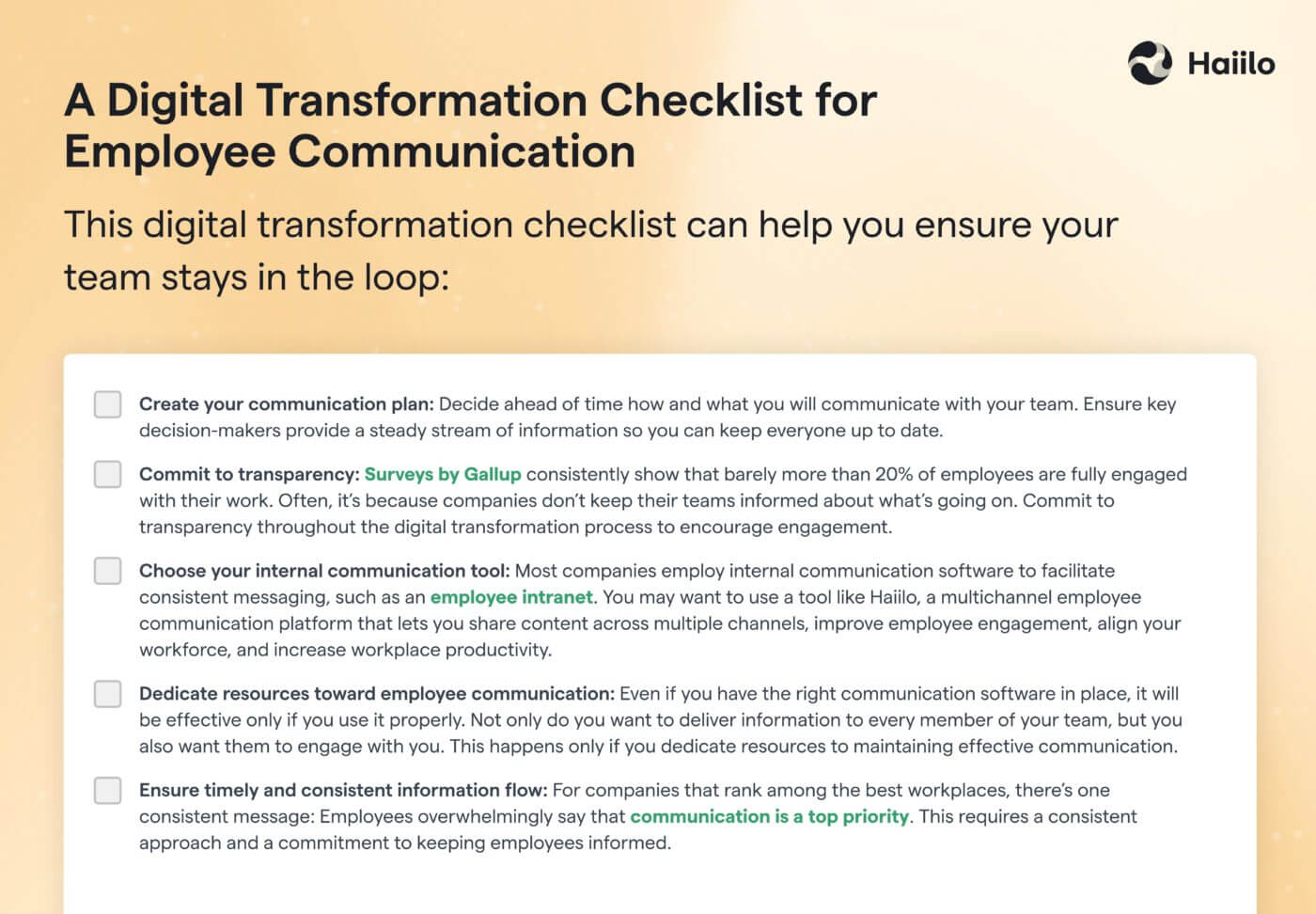Even though internal communication has a direct impact on employee experience and employee engagement, most businesses don’t have a long-term IC strategy. We share in this blog post a step-by-step guide to help you craft a great internal communication strategy.
You’re not alone.
60% of businesses don’t have a long-term strategy or vision for their internal communication and over 21% of internal communicators admit that there is no planning attached to their internal communication strategy.
💡Check out our article about Communication Strategies and How to Create Your Own.
This lack of strategy and planning is alarming as an internal communication system without a clear-cut strategy is bound to fail.
To help you with this, here’s a helpful guide to crafting an effective internal communication strategy for your workplace. Let’s get started!
Make executing your communications strategy effortless with the right IC tools
Why You Need an Internal Communication Strategy
A carefully planned strategy can do wonders for your company’s internal communication initiatives.
Here’s why:
Creating Organizational Alignment
Business leaders often fail to understand the purpose of internal communication and how it’s linked to your company’s business goals. Consequently, they might take a little effort to support your internal communication initiatives.
A documented strategy helps them appreciate the exact business benefits and earns their support – in terms of budgets, implementation, and personal participation.
Poor communication in the workplace increases employee frustration: a recent survey of 1,000 full-time employees across the US found that only 15% of employees are happy with the internal communication they’re experiencing in the workplace.
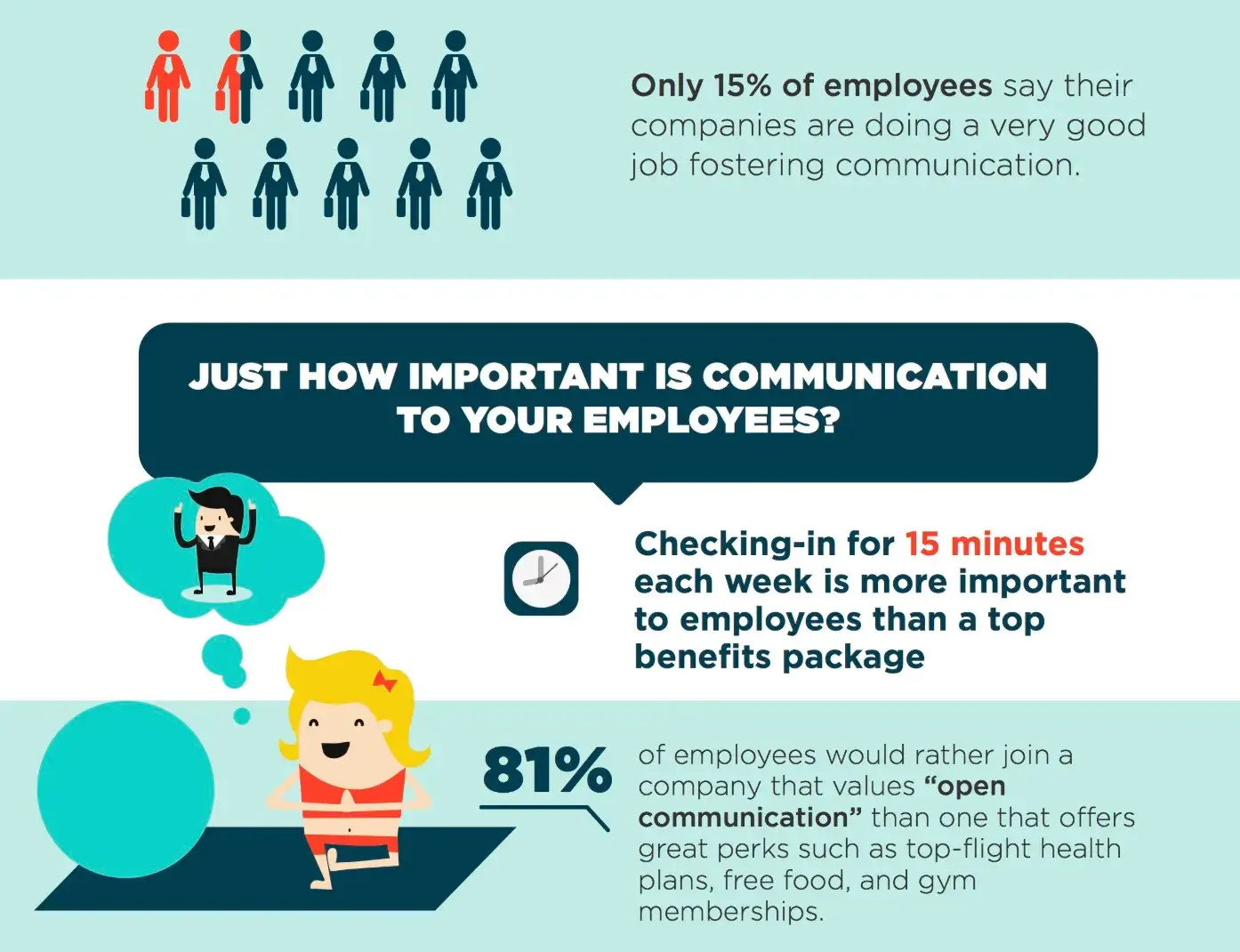
Easier Execution and Higher Employee Productivity
A well-crafted strategy lays out a clear plan for executing your internal communication initiatives. You know your goals, what resources and software you need, how to encourage participation, measure success and so on.
Without a clear strategy, all the above will fall flat.
Related: Internal Communication: Definition, Challenges and Top Reasons Why It’s More Important than Ever
What’s more, an effective internal communication improves employee productivity. Think about it: employees spend 2.5 hours a day looking for the information they need to complete their task. That’s more than one entire week lost every month.
The secret to improved employee productivity lies in your internal communication strategy. The McKinsey Global Institute found that employee productivity increases by 20-25% in organizations where employees are connected.
However, implementing an effective internal communication strategy is not an easy thing to do. Most businesses face challenges such as:
- Switching top-down-only information flow to inter-departmental information flow
- Collecting employees’ feedback and implementing solutions based on the collected feedback
- Engaging with employees regardless of their location
- Measuring progress regularly.
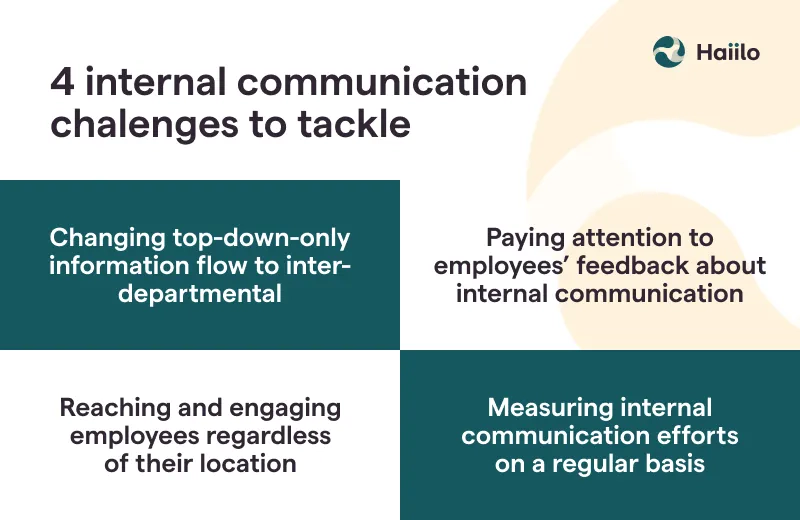
Creating an Effective Internal Communication Strategy in 8 Steps
There are a few key steps to take when building an effective internal communication strategy. These steps will ensure that your strategy is airtight and has the maximum benefits for all employees. They will help you overcome the biggest communication barriers and eliminate the biggest challenges IC professionals face today.
1. Review Your Current Strategy
Before revamping your employee communication strategy, it’s important to take stock of what’s currently in place.
Evaluate your current IC strategy to identify its strengths and weaknesses. Find out what you’d like to improve on. Ask yourself questions such as:
- How is your current strategy being implemented?
- What software and channels are you currently using?
- How effective is it?
- What impact does it have on company culture?
- What are the chief complaints you’ve been receiving about it?
Answering these questions will give you a good baseline to start with. You can then build and improve on this with your new strategy.
2. Define Your Audience
Before coming up with a plan for your workplace communication, it’s important to identify your audience.
Most companies make the mistake of treating their employees as one large, homogeneous demographic. This is problematic as different divisions of your company will want different things out of their communication channels.
For example, your software development and sales teams will have very different communication needs. Spend some time and segment your audience into different groups so that it is easier to give them what they need.
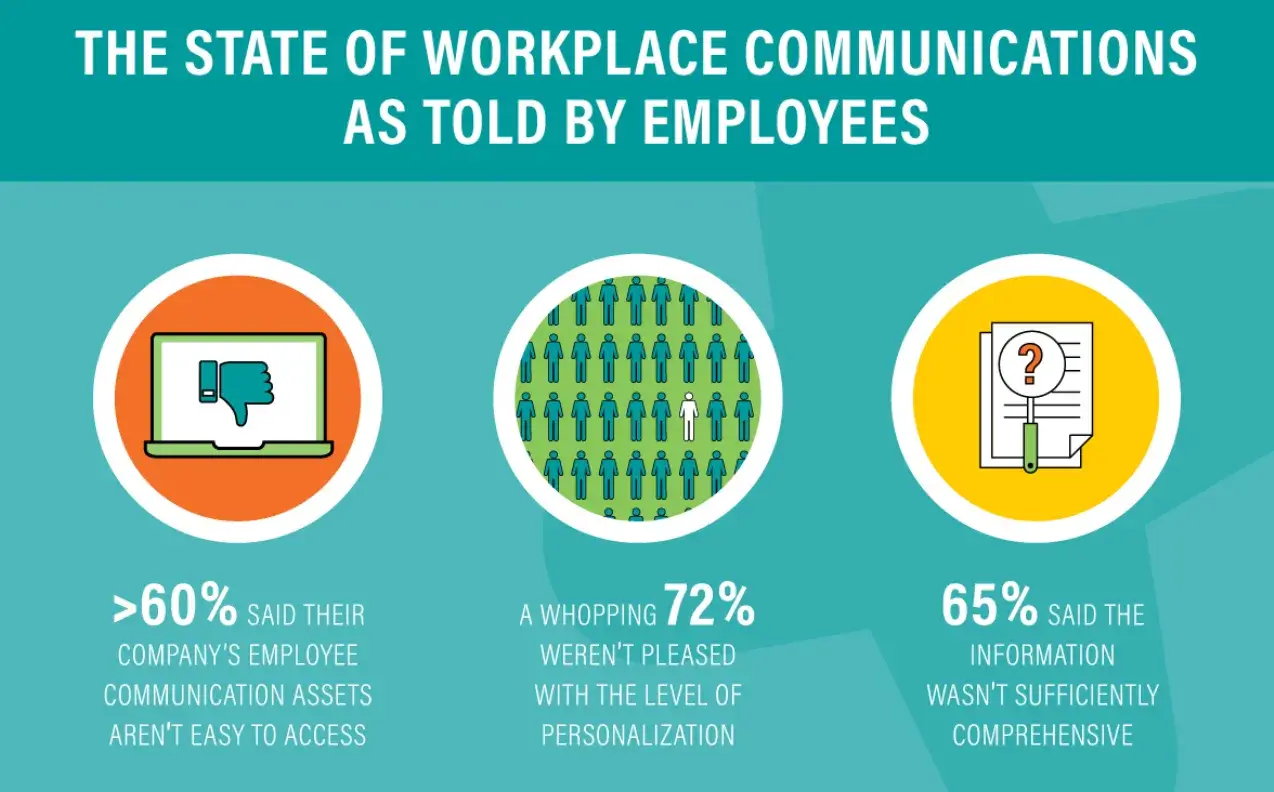
Your content distribution is key when it comes to internal communication.
If you want to engage your employees with your content, make sure that your employees get the right information at the right time. And to do so, distribute your content based on your employees’ role, expertise and language(s) they speak.
3. Set Clear Goals
It’s important to have concrete goals and timelines in place to add some structure to your planning process.
Devise reasonable timelines for planning, ideation and execution to set yourself up for success.
Goals should lay out what you want your internal communication efforts to achieve.
When coming up with goals, it’s essential to follow the SMART formula:
- Specific – your goals need to be concrete, not vague.
- Measurable – your goals must be quantifiable.
- Attainable – ensure that your goals are realistic with your current resources.
- Relevant – goals must be directly linked to your company’s aspirations.
- Time-bound – your goals must have deadlines to keep yourself on track.
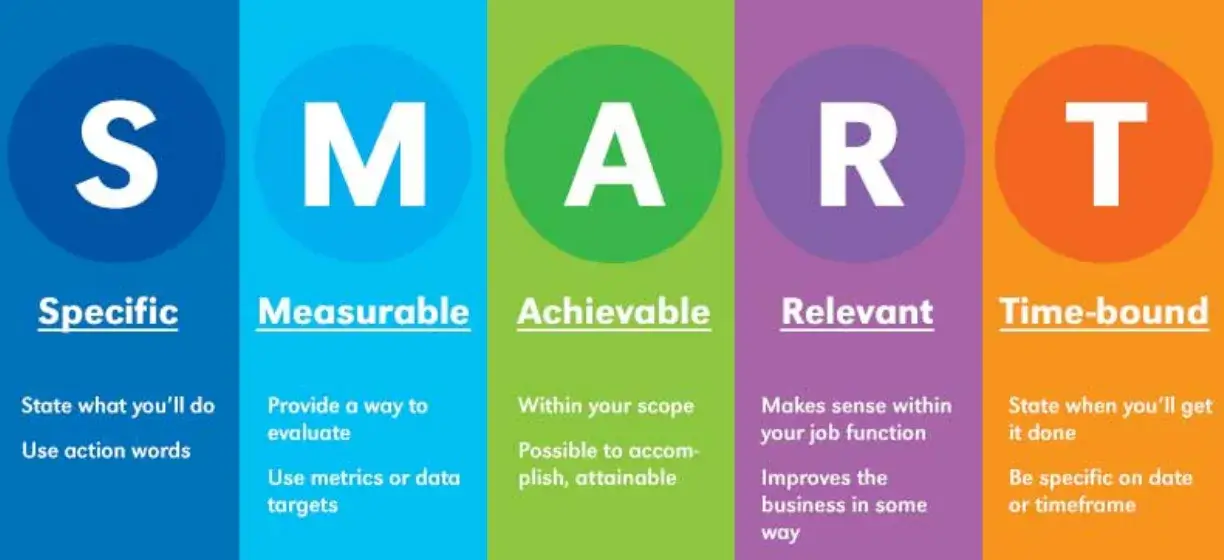
Measurement and goals go hand in hand. Therefore, at this stage, it’s also important to choose the key metrics you’ll be tracking to evaluate the success of your new IC strategy.
Related: 4 Smart Ways to Measure Your Internal Communication
It’s important to identify your goals on day one as these metrics will help shape the planning approach you take.
4. Define Your New Strategy
Now it’s time to hash out your vision for your new internal communication strategy.
Your new internal communication strategy should include:
- Clear goals
- An Audience segmentation
- Clear metrics
- Realistic timelines
- Ambassadors
- An internal communication solution
- The right content types
- An effective content distribution
Stakeholders: Who Is Responsible for Your Internal Communication?
You need to clearly determine who will take responsibility for different internal communication activities.
You need to assign specific roles to different stakeholders, such as:
- A few members of your executive leadership team should give the initial push.
- Influencers across teams and levels who will keep participating actively.
- HR and marketing team members who will measure and review your internal comms.
Unless these specific roles are assigned to specific people, the internal comms initiative will never be executed successfully.
Related: Who is Responsible for Internal Communication?
What Solution to Use for Your Internal Communication?
What internal communication platform will you choose? What features should you look for in the software?
If you want to drive adoption, you’ll need to use an internal communication solution that will encourage your employees to keep up with the company news.
Just sharing product updates or company news in a monthly newsletter is not the right way to engage with your employees.
Instead, make it easy for employees to keep up with the company news. You can also make your internal communication fun through gamification.
In a nutshell, the platform you’re going to implement should allow you to:
- Encourage your employees to keep up with the company news
- Make internal communication fun for your employees
- Measure the results
What Types of Content Should You Share to Drive Adoption?
You could share industry news, internal company updates, competitor updates, training materials and much more. Who will take ownership of sharing key pieces of content? How often will you share content with your employees?
To drive adoption and engagement, you should also share content that’s relevant to your employees’ roles.
For example, for your support team members, share case studies of other companies doing a great job with customer support. Since this topic is directly related to their jobs, they are far more likely to view and engage with it.
We’ll discuss more about this in the next section.
5. Optimize Your Content Distribution
Most employees feel overwhelmed by information overload. How do you make sure you minimize that overload, while simultaneously ensuring that each employee gets the right information at the right time?
Related: Why Your Employees Are Missing Out on Important Information
In step 2, you defined and segmented your audience. This will make it easier to effectively distribute your content and minimize information overload.
To help get your content distribution right, it’s important to identify what you want your employees to do with your content.
This will give you a better idea of providing customized content that aligns with their roles and aspirations.
Ask yourself questions like:
- What type of content is for internal consumption only?
- What type of content do you want your employees to share to their own social networks? This is where employee advocacy ties in with your internal communication efforts.
- What types of content do you want active discussions and participation around? These will need to be actively promoted by your internal influencers.
6. Identify Your Ambassadors
It’s important to establish key stakeholders in your organization who will act as promoters for your new internal comms strategy.
Remember, passive, company-wide mandates don’t work for internal comms. If you want your new internal communication system to work, you need active participation from your employees.
Identify individuals with influence in your organization who can spearhead the adoption process. This ensures easy assimilation and enables you to start measuring your progress quickly.
They don’t necessarily have to be department heads or top management. Team members who are well connected and popular can be influencers, irrespective of their seniority.
7. Measure Your Progress
Once you’ve started implementing your new strategy, use the metrics you’ve set up to evaluate whether your IC strategy meets the goals you established earlier or not.
Has it resulted in more engagement? Have your employee referrals gone up? Do you have better retention rates?
Some common metrics to track could be:
Engagement metrics
There are tons of different metrics you can use to measure engagement.
One common method is by measuring the number of likes, comments and shares your employees make on your posts in your internal communication platform like Haiilo. This is a good way to estimate how valuable your content is for your employees.
Employee Referrals
Employee referrals are another great method to track how effectively your internal comms and employee advocacy programs are working together. Compare the number of employee referrals you receive currently against the number of referrals that come in once your new strategy is implemented.
Productivity and Employee Engagement
Better internal communication should ideally lead to higher employee productivity and employee engagement.
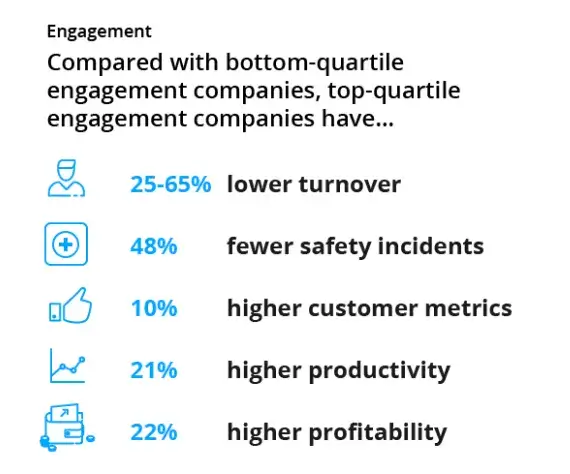
Social Shares
Employee advocacy programs are closely connected to internal communication.
Measure the total number of company-related social shares over a period of time. Higher social shares indicate that you are internally sharing more valuable content that your employees feel excited to share with their networks.
Remember to thoroughly track your metrics as what doesn’t get measured, won’t get done.
8. Review Your Strategy on a Regular Basis
When it comes to internal communication, consistency is the key!
Always conduct routine reviews to ensure that your internal communication strategy is working effectively.
What worked a couple of years ago might have become redundant. Don’t hesitate to continuously adapt and evolve!
Conduct regular feedback surveys to gauge your employees’ feelings towards your internal communication processes. Use their inputs to align it with their changing needs and aspirations.
💡 Related: Learn about the top 5 communications skills!
Conclusion
An internal communication strategy is an indispensable part of your communication ecosystem. Use these eight steps to ensure that your internal comms is backed by a solid planning process. Once you do, you can rest assured that your employees will make the most of it and stay productive.




